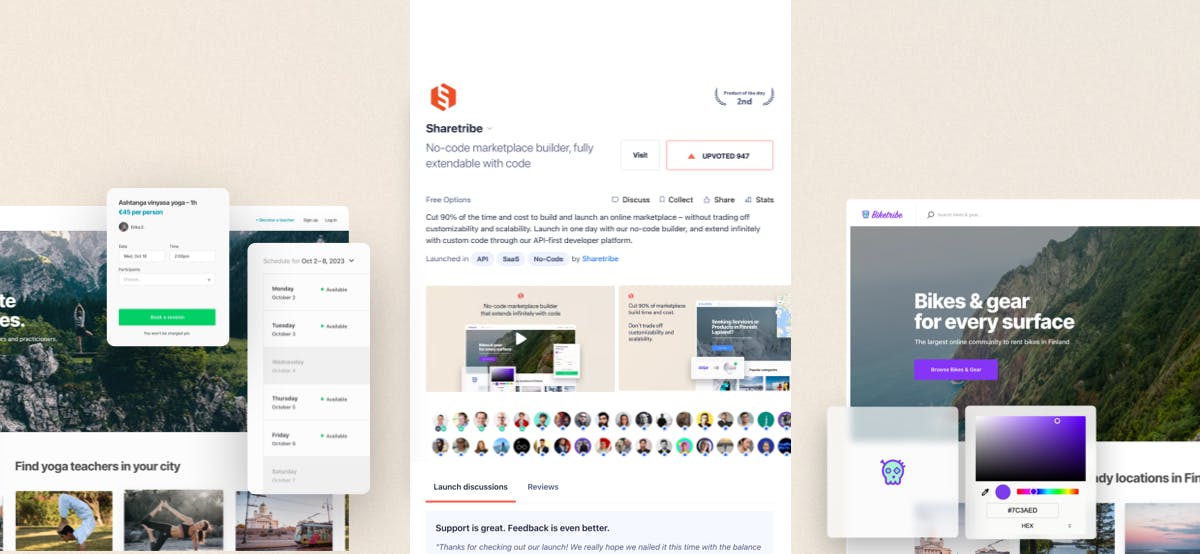Year in Review: Diversity, equity, and inclusion at Sharetribe in 2024
Learn about DEI work at Sharetribe in 2024 and how we’re moving forward in a shifting DEI landscape.
Jan 31, 2025

Sharetribe has had a dedicated DEI Council since 2020. During this time, we’ve completed initiatives on salary transparency, anonymous hiring, and more. You can read more about the DEI work done in 2020, 2021, 2022, and 2023 here in Balanced.
This past year, we’ve been working on our new marketplace builder. We started the year in a financially challenging situation, which also came up as a source of stress for team members working at Sharetribe in a recent DEI survey. In 2024, we worked on our new product, marketing, and customer satisfaction to turn things around. As our CEO Juho wrote on LinkedIn, the work paid off and we closed the year 2024 with record MRR growth.
While we were unsure about Sharetribe’s future, our priorities also shifted. In 2024, this also impacted DEI work at Sharetribe. To make it clear: we are not following in the footsteps of big tech companies that are abandoning DEI programs in the wake of a shifting political landscape. We believe this is vital and important work.
We retain yearly traditions like the DEI survey, first given in 2020, as well as practices like anonymous hiring and transparent salary adjustments rounds, which were conceived or improved with DEI Council input.
In 2024, Sharetribe’s DEI Council also took time to specify types of DEI work, gave feedback on hiring practices, and started work on a big theme: culture fit, inclusion, and self-management at the company, and how we can be more intentional in our support of new team members navigating our ways of working.
Learn more about DEI work at Sharetribe below and what we’re planning on focusing next.
Reactive and proactive DEI work
Our team size hasn’t grown significantly during the past five years and employee retention is over seven years. As we already wrote last year, “long-term team members have already brought up issues and suggestions, and once those have been addressed, new ones don’t necessarily arise”—at least at the same rate.
This prompted a discussion about reactive and proactive DEI work. Many of our previous initiatives had risen from feedback from team members. Should we still primarily work on things as they are brought up by the team (either publicly or through an anonymous feedback form)? And as those initiatives are fewer, does that mean the DEI Council is running out of work?
The short answer is: no. While we’ve improved things for the current team working at Sharetribe, DEI work doesn’t only include current employees. It is also about hiring, employer branding, product, and advocating for social change at large. And even for the current team, complacency can also lead to earlier issues resurfacing or new ones to arise.
The DEI Council chose to proactively look for things to improve and be intentional about it, especially now that topics don’t arise from the current team’s experience as before. Moving forward, we want to prioritize conversations around hiring, product accessibility, and choosing ethical suppliers and partners, in particular.
Anonymous hiring
In 2024, we completed one hiring process. We used our anonymous process, where the decision on who to invite for the first in-person interviews is made solely based on candidates’ answers to job-related questions. The applicant’s name, photo, and CV are not shown to the recruiters choosing the interviewees. You can learn more about the process in our 2021 DEI report.
As always with hiring, we also discussed how to make the process even more inclusive and get as diverse a group of candidates as possible. Throughout the hiring process and after it, our People Ops Manager Kinga has done a lot of networking with Finnish work organizations such as Startup Refugees.
Our newest team member Marta joined in January 2025. Following this process, we’re now 20 people with 10 nationalities. Hiring rarely means Sharetribe’s diversity increases slowly as well. We pride ourselves on our high employee retention rate and believe that running a business sustainably and responsibly is better also for any future hire as well as current team members.
DEI Survey
This year’s DEI survey revealed some positive trends but also offered areas for the DEI Council to work on in 2025.
Awareness and confidence in skill and career growth at Sharetribe increased from previous years. In addition, the company’s steward-ownership structure, balanced approach to work, and salary transparency got explicit mentions from recipients as positives. People feel they belong at Sharetribe.
Areas for improvement revealed a slight increase in dissatisfaction with compensation fairness, more work needed on supporting team members to become self-managed, and the need to think more closely about how we discuss controversial topics among the team and ensure no one feels censored. Our safer space guidelines also help with tough conversations.
Improvements to sick leave practices
The DEI Council received excellent anonymous feedback about unspoken rules or practices around sick leaves last year. One piece of feedback expressed concern about colleagues working while on sick leave. Another described an unspoken expectation to share the reason for sick leaves with the team.
Sharetribe’s sick leave policy is that you can take up to three days of sick leave by announcement, and for anything longer, you should get a doctor’s note (and the appointment is paid for by the company). For colleagues to know that you’ll be off, you announce a sick leave or absence in Slack.
Both pieces of feedback resulted in recommendations from the DEI Council. The first is to use your sick leave for recovery and remember that everyone is an example to others. The second was adding an explicit mention to our ways of working that no one is required to share the reason for their sick leave in public company channels. While some already (correctly) assumed this was completely optional, unspoken norms can create expectations, so it’s important to identify and dismantle them.
Sharing vs. privacy in our culture
The discussion on sharing a reason for a sick leave inspired the DEI Council to have a longer conversation about our culture and how to balance sharing and privacy at Sharetribe. Sharetribe’s company culture is open and sharing personal life experiences among colleagues, both positive and negative, is commonplace.
We believe this is a strength when building a community of co-workers, but the topic is much more nuanced. Generally, the more privilege someone holds, it can be easier to be vulnerable about personal issues because the risk of revealing something personal is lower. Sharing vulnerabilities may have a greater cost to someone in a less privileged position, even in a company like ours that champions DEI issues.
Not everyone feels comfortable sharing private matters with colleagues, and we want to make sure no one feels pressured to do so.
At the same time, there are benefits to sharing personal experiences. It can lead to finding help, support, or solutions. We can offer these things to our colleagues when we know what they’re going through, especially if something is affecting their ability to work. However, this sharing is always optional and can be done in smaller forums, such as with the internal team and closest colleagues. No one needs to share anything with the whole team at the expense of their comfort and privacy. Having privacy is just as important as having the opportunity to share.
What’s next? Thinking culture fit, inclusion, and self-management
At the end of 2024, we came to an important wider theme, discussions on which will continue in 2025. When hiring and retaining employees, how do we balance culture fit and inclusion?
We have strong company values, which are crucial to all decisions we make. Similarly, our steward-ownership structure makes us different from the average startup that seeks to grow through investment and maximizing profits. We hope everyone at Sharetribe shares (or doesn’t oppose) these values, and we have long highlighted value-alignment as an important part of hiring new people.
While we seek alignment with these values, Sharetribe’s working culture has other aspects we haven’t defined as clearly, partially because they are not so much active choices but results of our company structure and approach to work. For example, many team members have brought up that Sharetribe’s working culture is highly self-managed, yet we have little explicit guidelines or advice on how to achieve a self-managed working style.
In the coming year, we’ll continue work on this theme. As new people are joining the team, this work is even more important and topical. We’ll discuss culture fit and inclusion from the perspectives on hiring, neurodiversity, and other minority statuses. We’ll seek answers on how to define the requirements for current and new employees and how to support people learning these skills better—and not assume.
We’ll also keep working on any incoming, new topics that require input from a DEI perspective.



